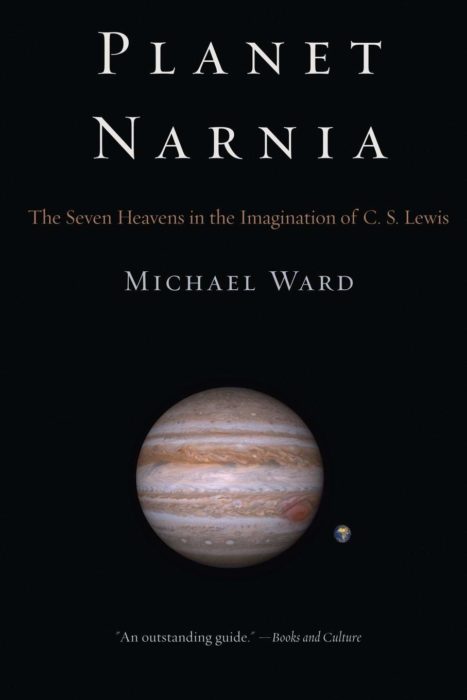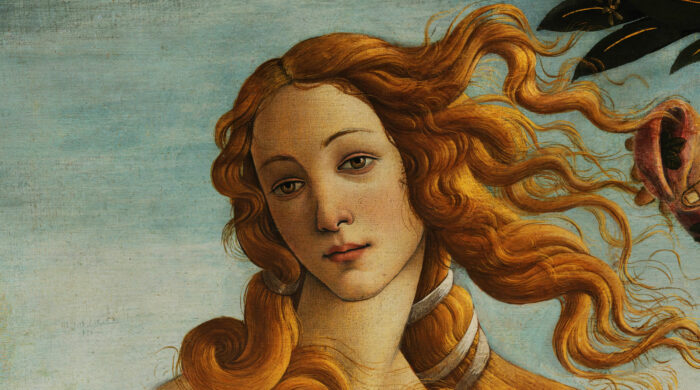Venus is More Than Just a Love Goddess
As of last year, my top three favorite books of all time—Milton’s Paradise Lost, Lewis’s Perelandra, and Tolkien’s Lord of the Rings1—welcomed a new friend, to become my top four favorite books of all time. The new nonfiction addition? Planet Narnia by Michael Ward.
With his premise that C. S. Lewis based each Narnia book on one of the “seven heavens” of the pre-Copernican model of the solar system, Ward not only enriched my view of Lewis, but also deepened my understanding and appreciation of mythology, medieval and Renaissance literature, and even stargazing.
Medieval Christians freely used and enjoyed the planets and the ancient mythological associations that have become inextricably tied to the planets. Christians saw these bodies as reflective of truths embedded deep in human consciousness. For Lewis, too, “the characters of the planets, as conceived by medieval astrology . . . have a permanent value as spiritual symbols.”2
 How we see the sky’s royal pantheon of symbols
How we see the sky’s royal pantheon of symbols
These celestial symbols are deep and rich, when we avoid the modern habit of reducing them to one-to-one correspondences (such as “Mars = war”). Instead, each planet carries a rich panoply of associations, symbols, and connections. For example, Mars does not only stand for war, but also forestry, growth, and masculinity, and he’s associated with spring. After all, March is his month.
Meanwhile, Venus is generally known as the goddess of love. But if we draw from Ward’s observations about Venus in Lewis’s The Magician’s Nephew, Perelandra, That Hideous Strength, and “The Planets,” we find more themes that Lewis inextricably links to Venus, such as laughter, beauty, motherhood, creativity, and paradise.
We might associate all of these themes with love, but they also easily fall outside love’s realm. For example, creativity brings to our minds fruitfulness or fertility. These ideas can result from love, but also encompass much more than just romance or procreation. Beauty and laughter, too, often coincide with love, yet also frequently fall outside love’s scope. We think of Venus as the love/sex goddess, but Lewis’s rich range of imagery shows that love is not all that Venus is about.
Yes, Venus includes love themes, but also a greater image
There may not be a one-to-one correspondence for Venus, but if there’s a general theme, it must surely be more all-encompassing than love, sex, or fertility. Yes, the fruitful unity of copulation is part of Venus’s influence, and may be one of the best symbols for Venus. But another theme is so closely linked to her that we must look beyond love for the final answer to Venusian imagery.
In particular it is the theme of paradise that kept defying my previous conceptions of Venus. In Lewis’s work, several elements relate to Venus—that is, they are Venusian: the freshly created Narnia, the perfect potential of the Wood Between the Worlds, the Eden-like garden of Hesperides, and the new world of Perelandra.
What do pre-Fall paradises have to do with love (other than love songs claiming that “ooohh, heaven is a place on earth”)?
I found the word I sought in Michael Ward’s treatment of That Hideous Strength, where Ward writes that the descent of Venus brings about “satisfaction of every fleshly appetite” 3 among other blessings.
Here I circled the word satisfaction. That is what Venus is about: to consummate a marriage, to experience the freedom of laughter, to run to the arms of a mother who accepts you (and feeds you) without qualification, to bask in beauty, to enter paradise. These all fall under the influence of satisfaction, of desires fulfilled.
I argue that Lewis supports this interpretation in “The Weight of Glory,” in which his invocation of Venus is no accident:
We are . . . to be given the Morning Star [Venus]. I think I begin to see what it means. In one way, of course, God has given us the Morning Star already: you can go and enjoy the gift on many fine mornings if you get up early enough. What more, you may ask, do we want? Ah, but we want so much more. . . . We do not want merely to see beauty, though, God knows, even that is bounty enough. We want something else which can hardly be put into words—to be united with the beauty we see, to pass into it, to receive it into ourselves, to bathe in it, to become part of it. . . . We cannot mingle with the splendours we see. But all the leaves of the New Testament are rustling with the rumour that it will not always be so. Some day, God willing, we shall get in.4
In an essay filled with the idea of “our longing to be reunited with something in the universe from which we now feel cut off,”5 Lewis clearly connects being given the morning star, Venus, with finally fulfilling that “deep desire.”6
Venus illuminates our true and better satisfaction
What do we gain by seeing that Venus represents satisfaction and desire fulfilled?
First, we understand more of Lewis. In all Lewis’s life, he tagged experiences of Joy, which he defines as “an unsatisfied desire which is itself more desirable than any other satisfaction.”7 And in Mere Christianity, he famously argues:
“If I find in myself a desire which no experience in this world can satisfy, the most probable explanation is that I was made for another world. If none of my earthly pleasures satisfy it, that does not prove that the universe is a fraud. Probably earthly pleasures were never meant to satisfy it, but only to arouse it, to suggest the real thing.”8
No wonder Venus became such an important planet to Lewis—in fact, his favorite planet, after Jupiter. Venus encapsulates in itself his entire argument about Joy.
Through Venus, Lewis also shows us more about the true nature of satisfaction. As Ward notes, “Venus, more than any of the other planets, can properly operate only under Jupiter’s sovereign and cynosural influence.”9
In our real-life culture, we constantly pursue satisfaction through sex, food, or our latest Netflix binge, only to have satisfaction elude our grasp, making us disappointed and harsh rather than beautiful and productive. If we chase satisfaction beyond the King’s bounds, outside the King’s way, we are doomed to find only twisted and soured “satisfaction.” Outside of this King’s headship, Venus is no longer Fortuna Minor, but becomes Venus Infernal: in Lewis’s world, she is more like Jadis, the capricious and selfish pagan goddess we find in myths.
We can only properly pursue and receive not just love, but all satisfaction, from a beneficent, authoritative king. The King. In Lewis, alluring Venus beckons us to find True Satisfaction at last. As Lewis phrased it: some day, God willing, we shall get in.
- “That still only counts as one!” ↩
- C. S. Lewis, “The Alliterative Metre,” quoted in Michael Ward, Planet Narnia. Oxford UP, 2008, page 30. ↩
- Michael Ward, Planet Narnia, p. 174 ↩
- C. S. Lewis, “The Weight of Glory.” The Weight of Glory, HarperCollins, 2001. pp. 42-43 ↩
- Ibid. 42 ↩
- Ibid. 39 ↩
- C. S. Lewis, Surprised by Joy. Harvest, 1984, pages 17–18. ↩
- C. S. Lewis, Mere Christianity. HarperCollins, 2001, pages 136–137. ↩
- Michael Ward, Planet Narnia, p. 52 ↩

































Interesting article. I have read the Narnia books, but not the others mentioned. You did know Lewis‘s wife was named Joy? I must admit that I have never considered the points you brought up regarding the planet Venus. Now I am interested in reading the Planet Narnia. Thanks for sharing.
Thanks for the comment, Rachel! Yes, I love that his wife was named Joy. I’ve always thought it was such a cool thing that God wrote Lewis’s love story that particular way.
Planet Narnia is a GREAT book, and I can also highly recommend The Narnia Code, which is Ward’s book on all the same subject matter–but is written less like a PhD dissertation! 🙂
Very good. I am currently reading Planet Narnia. It’s a challenging book, very scholarly, but I’m enjoying the scholarship and the thorough exploration he gives of Lewis in this book.
Isn’t it great?! It gives you so much to chew on. I felt I could barely contain what each chapter delivered!